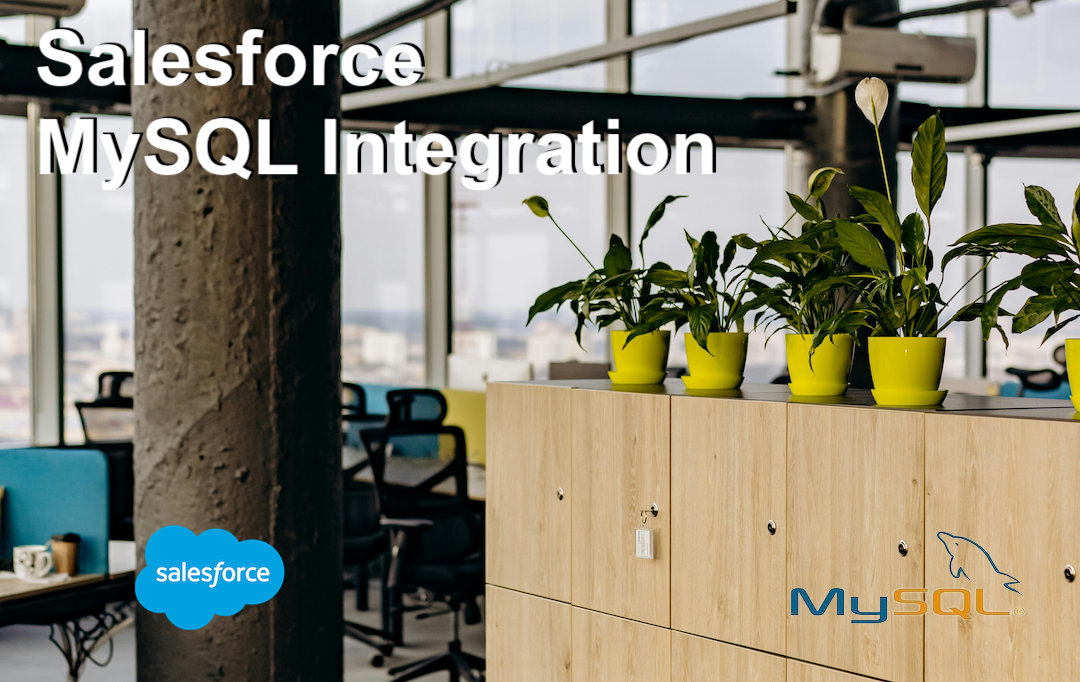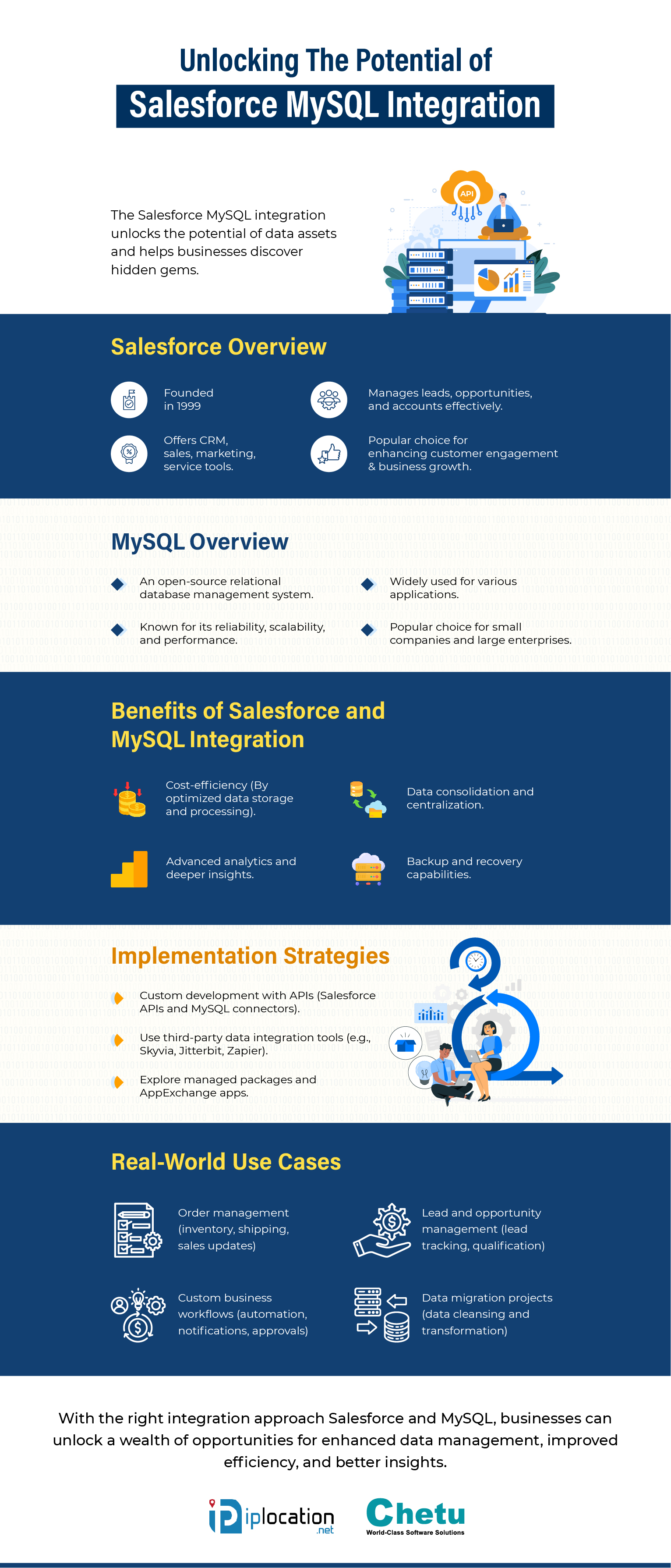
Salesforce is a powerful tool for managing all aspects of customer relationships in an organization. MySQL is a great solution to keep data records in a structured manner. Each service is outstanding in resolving the tasks it’s destined to perform, but the Salesforce MySQL integration can reveal the secrets of the black box. It unlocks the potential of data assets and helps businesses discover hidden gems.
This article explains how the combination of data from both Salesforce and MySQL benefits companies. It also reveals the most popular and easy-to-implement strategies for combining those tools. And finally, it provides real-life use cases to help you understand when the MySQL integration with Salesforce is worth its weight in gold.
Several Words About Salesforce and MySQL Services
Salesforce Overview
Founded in 1999, Salesforce offers a range of software solutions designed to streamline various aspects of customer relationship management, sales, marketing, and service activities. It provides tools for sales teams to manage leads, opportunities, and accounts effectively, as well as support teams to deliver personalized customer service across different channels. Salesforce provides the Apex programming language that allows customers to customize Salesforce applications utilizing Custom Salesforce Apex Development.
Salesforce also offers solutions for digital marketing, e-commerce, community engagement, and data analytics. With its user-friendly interface and scalable architecture, Salesforce has become a popular choice for organizations seeking to enhance customer engagement, streamline operations, and drive business growth.
MySQL Overview
MySQL is an open-source relational database management system (RDBMS) for efficient data storage, management, and retrieval. It’s known for its reliability, scalability, and performance, which makes it a popular choice for small companies and large enterprises. MySQL is widely used for various applications, from small websites to large-scale systems.
Benefits of Salesforce and MySQL Integration
Even though Salesforce is one of the best solutions for CRM, it also has its limitations. For instance, it restricts the number of records and user information stored in the system. Meanwhile, MySQL is designed to scale efficiently, making it suitable for handling large volumes of data and high traffic loads. As a result, MySQL can compensate for the drawbacks of Salesforce.
Here are some other benefits you can experience by connecting Salesforce to MySQL.
- Cost-efficiency. Integrating MySQL with Salesforce can save costs by optimizing data storage and processing resources. Salesforce storage costs may increase as data volumes grow, while MySQL provides more cost effective storage options for large datasets.
- Advanced analytics. Combining data from Salesforce and MySQL enables more comprehensive analytics. Thus, businesses can gain deeper insights into customer behavior, sales trends, and business performance.
- Data consolidation. In case MySQL is the company's central database, Salesforce data could be transferred easily there via the chosen integration method.
- Backup and recovery. MySQL can be seen as the storage for Salesforce data backup. In case of any system malfunctions, hacker attacks, or data loss, the data could be easily restored to Salesforce from MySQL.
Implementation Strategies
There are several ways to connect MySQL with Salesforce. Each of them is characterized by the complexity level, flexibility, and customization options. Here are some common methods to perform integration.
1. Custom Development with APIs
Utilize Salesforce APIs (SOAP API, REST API, or Bulk API) and MySQL connectors (JDBC or ODBC) to establish a direct connection between Salesforce and MySQL. Develop custom code in programming languages like Java, Python, or PHP to retrieve data from MySQL, transform it into Salesforce-compatible formats, and then insert or update records in Salesforce objects using APIs.
2. Third-Party Data Integration Tools
Cloud services like Skyvia, Jitterbit, or Zapier offer out-of-the-box integrations, customizable data mappings, and automated workflows to facilitate seamless data synchronization between Salesforce and MySQL with minimal coding requirements. What’s more, such tools don’t cost much, so any business can use them for performing integrations. For instance, Skyvia offers free plans as well as enterprise solutions, which differ in terms of features available and the number of data records to use.
3. Managed Packages and AppExchange Apps
Explore managed packages and Salesforce AppExchange apps that offer pre-built integration solutions for connecting Salesforce with MySQL databases. These packages may provide features like bi-directional data synchronization, schema mapping, and data cleansing capabilities tailored for specific use cases or industries.
Real-World Use Cases
Companies implementing both MySQL and Salesforce in their workflows aren’t obliged to integrate those services. Find the typical use cases below to see when and how the potential of integration gets unlocked.
- Order management. MySQL provides order visibility with all the necessary details, shows inventory levels, and provides shipping information. Once you sync this data with Salesforce, sales reps obtain real-time order status updates.
- Lead and opportunity management. MySQL captures leads from various sources, tracks lead interactions, and qualifies leads based on custom criteria. Synching qualified leads and opportunities with Salesforce ensures centralized lead management and tracking.
- Custom business workflows. Use MySQL to trigger workflow events, update records, perform custom calculations based on specific business rules, and sync relevant data with Salesforce to automate tasks, notifications, and approvals across sales, marketing, and support teams.
- Data migration projects. MySQL Salesforce integration allows users to migrate data from legacy systems and apply cleansing and transformation to it. Then, cleansed and transformed data is transferred to Salesforce to ensure data accuracy and integrity during migration or integration efforts.
These use cases demonstrate the versatility and value of integrating MySQL with Salesforce to streamline business processes, improve data visibility, and enhance customer engagement and insights.

Summary
There are several ways to connect Salesforce with MySQL: by using APIs, via third-party integration tools such as Skyvia, and through AppExchage Apps. Integration might be the most suitable when a company wants to improve order management, deploy custom workflows, or implement data migration projects successfully.
Share this post
Leave a comment
All comments are moderated. Spammy and bot submitted comments are deleted. Please submit the comments that are helpful to others, and we'll approve your comments. A comment that includes outbound link will only be approved if the content is relevant to the topic, and has some value to our readers.

Comments (0)
No comment